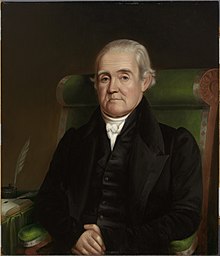Noah Webster
Noah Webster (born October 16, 1758 in West Hartford ; died May 28, 1843 in New Haven, Connecticut ) was an American lexicographer , spelling reformer , publicist , translator, and writer. Most of the differences go to its reform in the spelling of the American against the British English back.
Life
Webster came from an ancient Puritan family . On his mother's side, he was descended from William Bradford , the second governor of the Plymouth colony . In 1774 he began studying at Yale University , which he interrupted when the American War of Independence broke out to fight the English in his father's militia. From his youthful enthusiasm for the independence movement grew his linguistic reform ideas, which should also bring the USA cultural independence.
In 1781 he was admitted to the bar, although he could not find a job and therefore worked as a teacher in private schools. In 1788, Webster was involved in the short-lived attempt to found a Philological Society in New York. In 1799 he was elected to the American Academy of Arts and Sciences .
The Spelling Book
Webster's first publication was the three-volume A Grammatical Institute of the English Language (1783–85), which consisted of a grammar, a spelling aid and a primer. The spelling aid became a bestseller, later called The American Spelling Book , with a circulation of 60 million by 1890 alone. Practically all American school children learned spelling from the Blue Backed Speller , as the book was called because of its blue cover.
Webster's Dictionary
Webster published his first dictionary, A Compendium Dictionary of the English Language, with around 28,000 entries in 1806 . Because he wanted to establish a "national language", he implemented a new, simplified spelling, whereby he mainly deleted silent letters. For example, he replaced color with color , deleted an L in traveler or changed center to center . Other suggestions, such as removing the last, silent e in definite or feather , did not prevail. In Great Britain, Webster's reforms met with vehement opposition.
A greatly expanded version of his dictionary appeared in 1828 as An American Dictionary of the English Language with around 70,000 entries. Mainly because Webster had included numerous words from science and technology, around half of all keywords can not be found in the corresponding British counterpart, Samuel Johnson's Dictionary of the English Language . The claim to be American , on the other hand, hardly relates to the vocabulary, because apart from a few words such as congress , caucus or plantation , most of the words were also known in British English. Characteristic of the American dictionary tradition that Webster established is also numerous encyclopedic information such as the names of cities or the indication of population figures.
Webster's dictionary was such a success that "Webster's" soon became a synonym for "dictionary" in American parlance and, similar to the German Duden, was considered authoritative in all cases of doubt. Together with his grammar and spelling aid, he helped American English to gain an independent identity.
After Webster's death, his name was not trademarked , so many publishers put his name on their dictionaries. The two brothers George and Charles Merriam bought the rights to the 1828 version, and today Merriam-Webster is considered the standard dictionary of American English. An expanded edition appeared in 1913; these and all older versions are in the public domain today . Although the dictionaries of the Merriam-Webster publishing house (a subsidiary of Britannica ) go back directly to Noah Webster's client, many other publishing houses such as Random House or John Wiley & Sons use the Webster name.
Webster's Bible translation
Webster published a Bible translation in 1833 based on the King James Bible , taking into account the Greek and Hebrew original versions. He replaced obsolete words, updated grammar, and replaced some phrases that he found offensive.
Secondary literature
- E. Jennifer Monaghan: A Common Heritage: Noah Webster's Blue-Back Speller . Archon Books, Hamden CN 1983, ISBN 0208019081 .
- John S. Morgan: Noah Webster . Mason and Charter, New York 1975, ISBN 0884051080 .
- Richard M. Rollins: The Long Journey of Noah Webster . University of Pennsylvania Press, Philadelphia 1980, ISBN 0812277783 .
- K. Alan Snyder: Defining Noah Webster: Mind and Morals in the Early Republic . University Press of America, Lanham MD 1990, ISBN 0819178624 .
- Harry R. Warfel: Noah Webster, Schoolmaster to America . Macmillan, New York 1936.
Web links
| personal data | |
|---|---|
| SURNAME | Webster, Noah |
| BRIEF DESCRIPTION | American lexicographer, spelling reformer, publicist, translator, and writer |
| DATE OF BIRTH | October 16, 1758 |
| PLACE OF BIRTH | West Hartford |
| DATE OF DEATH | May 28, 1843 |
| Place of death | New Haven (Connecticut) |
